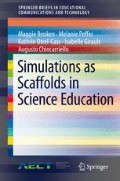Abstract
We briefly describe inquiry-based science education (IBSE) and problem-based learning (PBL)—two current, prominent approaches to science education. Rather than an exhaustive review of the theoretical underpinnings and empirical support for IBSE or PBL, what follows is an attempt to highlight the fundamental underlying motivation and primary learning objectives of these approaches to science education. In prior sections, we have defined computer simulations as algorithmic, dynamic, often simplified models of real-world or hypothetical phenomenon that contain features which not only allow but promote the exploration of ideas, manipulation of parameters, observation of events, and testing of questions. The motivations and objectives of IBSE and PBL emphasized here, including learner-driven characteristics and knowledge- and skill-based outcomes, have been selected as those most relevant to our definition of simulations. We close this section with a comment on the challenges of IBSE and PBL that call for scaffolding supports.
The original version of this chapter was revised. The erratum to this chapter is available at: DOI 10.1007/978-3-319-24615-4_7
An erratum to this chapter can be found at http://dx.doi.org/10.1007/978-3-319-24615-4_7
Access this chapter
Tax calculation will be finalised at checkout
Purchases are for personal use only
References
Abd-El-Khalik, F., BouJaoude, S., Duschl, R., Lederman, N. G., Mamlok-Naaman, R., Hofstein, A., et al. (2004). Inquiry in science education: International perspectives. Science Education, 88(3), 397–419.
Aikenhead, G. S. (2005). Science for everyday life: Evidence-based practice. New York, NY: Teachers College Press.
Bolstad, R., & Hipkins, R. (2008). Seeing yourself in science (Report). Wellington, New Zealand: New Zealand Council for Educational Research.
Chinn, C. A., & Malhotra, B. A. (2002). Epistemologically authentic inquiry in schools: A theoretical framework for evaluating inquiry tasks. Science Education, 86(2), 175–218. doi:10.1002/sce.10001.
Duschl, R., Schweingruber, H., & Shouse, A. (Eds.). (2007). Taking science to school: Learning and teaching science in grades K-8. Washington, DC: National Academies Press.
European Commission. (2007). Science education NOW: A renewed pedagogy for the future of Europe. Community research report: Luxembourg: Office for Official Publications of the European Communities. Retrieved from internal-pdf://report-rocard-on-science-education_en-4063993856/report-rocard-on-science-education_en.pdf.
Feldman, A., Konold, C., Coulter, B., Conroy, B., Hutchison, C., & London, N. (2000). Network science, a decade later: The internet and classroom learning. Mahwah, NJ: Lawrence Erlbaum Associates.
Fensham, P. J. (2006). Humanistic science education: Moves from within and challenges from without. In Proceedings of XII IOSTE symposium, Penang, China.
Hakkarainen, K., & Sintonen, M. (2002). Interrogative model of inquiry and computer-supported collaborative learning. Science & Education, 11, 25–43.
Hmelo-Silver, C. E., Duncan, R. G., & Chinn, C. A. (2007). Scaffolding and achievement in problem-based and inquiry learning: A response to Kirschner, Sweller, and Clark (2006). Educational Psychologist, 42(2), 99–107. doi:10.1080/00461520701263368.
Kirschner, P. A., Sweller, J., & Clark, R. E. (2006). Why minimal guidance during instruction does not work: An analysis of the failure of constructivist, discovery, problem-based, experiential, and inquiry-based teaching. Educational Psychologist, 41(2), 75–86 [KO8].
Lee, H.-S., Linn, M. C., Varma, K., & Liu, O. L. (2010). How do technology-enhanced inquiry science units impact classroom learning? Journal of Research in Science Teaching, 47(1), 71–90. doi:10.1002/tea.20304.
Minner, D. D., Levy, A. J., & Century, J. (2010). Inquiry-based science instruction: What is it and does it matter? Results from a research synthesis years 1984 to 2002. Journal of Research in Science Teaching, 47(4), 474–496.
National Research Council. (2012). A framework for K-12 science education: practices, crosscutting concepts, and core ideas. Washington, DC: The National Academies Press.
OECD. (2006, May). Organisation for economic co-operation and development global science forum evolution of student interest in science and technology studies policy report.
Roth, W. M. (2013). What more in/for science education: An ethnomethodological perspective. Rotterdam: Sense Publishers.
Savery, J. R., & Duffy, T. M. (1996). Problem based learning: An instructional model and its constructivist framework. In B. G. Wilson (Ed.), Constructivist learning environments: Case studies in instructional design (pp. 135–150). Englewood Cliffs, NJ: Educational Technology Publications, Inc.
Scardamalia, M., & Bereiter, C. (1994). Computer support for knowledge-building communities. The Journal of the Learning Sciences, 3(3), 265–283.
Strobel, J., & van Barneveld, A. (2009). When is PBL more effective? A meta-synthesis of meta-analyses comparing PBL to conventional classrooms. Interdisciplinary Journal of Problem-Based Learning, 3(1). doi:10.7771/1541-5015.1046.
Walker, A., & Leary, H. (2009). A problem based learning meta analysis: Differences across problem types, implementation types, disciplines, and assessment levels. Interdisciplinary Journal of Problem-Based Learning, 3(1), 3–24. doi:10.7771/1541-5015.1061.
Author information
Authors and Affiliations
Rights and permissions
Copyright information
© 2016 AECT
About this chapter
Cite this chapter
Otrel-Cass, K., Renken, M., Peffer, M., Girault, I., Chiocarriello, A. (2016). Inquiry-Based Science Education and Problem-Based Learning: Motivations, Objectives, and Challenges Relevant to Computer Simulations. In: Simulations as Scaffolds in Science Education. SpringerBriefs in Educational Communications and Technology. Springer, Cham. https://doi.org/10.1007/978-3-319-24615-4_4
Download citation
DOI: https://doi.org/10.1007/978-3-319-24615-4_4
Published:
Publisher Name: Springer, Cham
Print ISBN: 978-3-319-24613-0
Online ISBN: 978-3-319-24615-4
eBook Packages: EducationEducation (R0)

